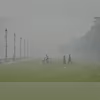The Commission for Air Quality Management (CAQM) enforced Stage 4 of the Graded Response Action Plan (Grap) in Delhi-NCR starting 8 am today (November 18). This measure follows the region’s Air Quality Index (AQI) crossing into the ‘severe plus’ category, signalling a critical air pollution emergency.
Out of the 35 air quality monitoring stations in Delhi, most recorded AQI levels exceeding 400 on Sunday. Dwarka reported the highest reading of 499. A dense smog layer has enveloped the city for the sixth day in a row, reducing visibility to just 150 metres. The India Meteorological Department has issued an ‘orange’ alert for dense fog, warning of continued weather-related challenges.
The Grap sub-committee convened an emergency meeting on November 17 to assess meteorological conditions, forecasts, and air quality trends. The progressive stages of Grap — Stage 1, 2, and 3 — were triggered earlier on October 14, October 21, and November 14, respectively. With the AQI reaching 441 on Sunday afternoon and peaking at 468 by night, the city logged its fourth ‘severe’ day this month.
What is banned under Grap Stage IV?
>Entry of non-essential trucks and non-BS-VI light commercial vehicles into Delhi is prohibited.
>Diesel-operated medium and heavy goods vehicles (BS-IV and older) are barred, except those carrying essential items.
>All construction and demolition activities for public infrastructure projects, such as roads, highways, flyovers, and power lines, are suspended.
More From This Section
>The order prohibits entry of trucks into Delhi unless they are carrying essential goods or operating on clean fuels. Non-essential light commercial vehicles registered outside Delhi are also barred, except for those running on electric, CNG, or BS-VI diesel engines.
>The panel suggested that offices in the National Capital Region operate at 50 per cent capacity, with the remainder working from home. Work-from-home options may also be implemented for central government employees.
>State governments have been advised to consider closing colleges, restricting non-essential commercial activities, and introducing odd-even vehicle rules.
What major projects will be impacted due to Grap-IV?
Several infrastructure initiatives, construction of three underpasses aimed at easing traffic congestion at Mukarba Chowk and Haiderpur Metro Road has been paused.
Additionally the underpass connecting Bhairon Marg to the Ring Road near Pragati Maidan is also on hold.
Work on the Barapula Elevated Corridor Phase-3 near Mayur Vihar Phase-1 and Yamuna Khadar has been disrupted, further extending project timelines.
Meanwhile, the construction of four new hospitals across Delhi, intended to enhance the city's healthcare infrastructure, will also face setbacks due to the suspension of construction activities.
Delhi’s air quality raises public health concerns
Delhi Chief Minister Atishi announced the suspension of physical classes for all students except those in Classes 10 and 12, with virtual lessons replacing in-person teaching. Additionally, authorities are considering measures like halving office attendance, shifting to work-from-home policies, and limiting vehicle movement with odd-even registration schemes.
The government has advised residents, especially children, the elderly, and individuals with chronic illnesses, to avoid outdoor activities due to health risks from prolonged exposure to hazardous air.
When are Grap stages implemented?
1. Grap-I (AQI 201-300): Advisories, dust control, and bans on open burning.
2. Grap-II (AQI 301-400): Diesel generator restrictions, enhanced cleaning, and road sprinkling.
3. Grap-III (AQI 401-450): Non-essential construction bans, vehicle entry restrictions, and curbs on industrial activity.
4. Grap-IV (AQI above 450): Complete construction halts, school closures, and stringent vehicle limitations.
Will the pollution in Delhi improve anytime soon?
CAQM has said that in the coming days, there is no respite in sight due to persistent poor air quality, worsened by dense fog and unfavourable weather conditions. Authorities predicted AQI levels will remain in the 'severe' or 'severe plus' category in the coming days. Measures like stricter attendance policies and reduced commercial activity may follow if conditions do not improve.
)